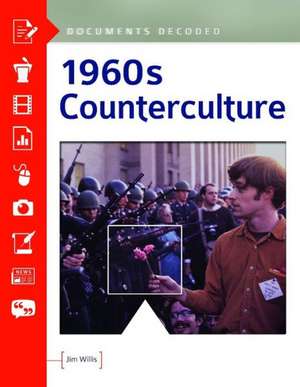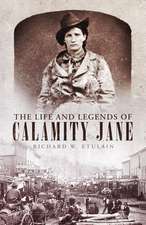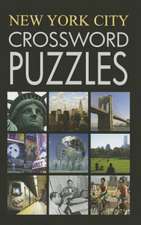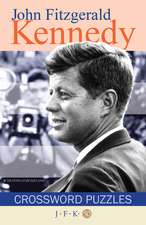1960s Counterculture: Documents Decoded: Documents Decoded
Autor Jim Willisen Limba Engleză Hardback – 23 mar 2015 – vârsta până la 17 ani
Din seria Documents Decoded
- 47%
 Preț: 377.48 lei
Preț: 377.48 lei - 47%
 Preț: 377.18 lei
Preț: 377.18 lei - 47%
 Preț: 374.82 lei
Preț: 374.82 lei - 48%
 Preț: 370.53 lei
Preț: 370.53 lei - 47%
 Preț: 374.82 lei
Preț: 374.82 lei - 47%
 Preț: 388.50 lei
Preț: 388.50 lei - 41%
 Preț: 388.01 lei
Preț: 388.01 lei - 47%
 Preț: 385.65 lei
Preț: 385.65 lei - 47%
 Preț: 352.72 lei
Preț: 352.72 lei - 42%
 Preț: 349.94 lei
Preț: 349.94 lei - 42%
 Preț: 350.81 lei
Preț: 350.81 lei - 47%
 Preț: 386.60 lei
Preț: 386.60 lei - 51%
 Preț: 361.68 lei
Preț: 361.68 lei - 47%
 Preț: 391.34 lei
Preț: 391.34 lei - 47%
 Preț: 378.13 lei
Preț: 378.13 lei
Preț: 362.95 lei
Preț vechi: 637.42 lei
-43% Nou
Puncte Express: 544
Preț estimativ în valută:
69.45€ • 72.70$ • 57.80£
69.45€ • 72.70$ • 57.80£
Carte tipărită la comandă
Livrare economică 31 martie-14 aprilie
Preluare comenzi: 021 569.72.76
Specificații
ISBN-13: 9781610695220
ISBN-10: 1610695224
Pagini: 252
Dimensiuni: 216 x 279 x 13 mm
Greutate: 0.45 kg
Editura: Bloomsbury Publishing
Colecția ABC-CLIO
Seria Documents Decoded
Locul publicării:New York, United States
ISBN-10: 1610695224
Pagini: 252
Dimensiuni: 216 x 279 x 13 mm
Greutate: 0.45 kg
Editura: Bloomsbury Publishing
Colecția ABC-CLIO
Seria Documents Decoded
Locul publicării:New York, United States
Caracteristici
Examines exhibits as varied as Abbie Hoffman's testimony at the trial of the Chicago 7, Noam Chomsky's essay "The Function of a University in Time of Crisis," the Port Huron speech of the Students for a Democratic Society, Richard Nixon's Silent Majority speech, and Shirley Chisholm's Equal Rights for Women speech
Notă biografică
Jim Willis, PhD, is a writer and professor of journalism at Southern California's Azusa Pacific University. He has authored or coauthored more than a dozen books on the news media, international images, and history.
Cuprins
Introduction: Seeds of the 1960s Protest Movement, Chapter 1 Raised Voices: The Berkeley Free Speech Movement, Freedom of Speech, The First Amendment to the U.S. ConstitutionRatified December 15, 1791"A Spectre Is Haunting the University," Leaflet from the FSM Steering CommitteeDecember 1964"The Bodies upon the Gears," Mario Savio's Speech on the Sproul Hall Steps, UC-BerkeleyDecember 2, 1964The Function of the University in Time of Crisis, Noam Chomsky's Speech on the Role of the University1969Chapter 2 Flowers in Their Hair: Voices of the Hippie Movement, "The Class Structure of Hippie Society," Dr. Sherry Cavan's Article on the Economics of Hippie SocietyOctober 1972"The Gathering of the Tribes," Promotional Article in the San Francisco OracleJanuary 1967"Trip without a Ticket," The Digger PapersAugust 1968"The Community of the Tribe," Tom Law's Article on Hippie Culture1967"Marxism and Nonviolence," A Conversation with Isaac DeutscherMay 1966Chapter 3 Hell No, We Won't Go: Protesting the Vietnam War, The Port Huron Statement, Students for a Democratic Society's ManifestoJune 1962"The Incredible War," Paul Potter's Essay on the Vietnam WarApril 7, 1965"The Great Silent Majority," President Richard Nixon's Address to the American PeopleNovember 3, 1969Chapter 4 We Shall Overcome: Protesting Racial Discrimination, "A Moral Crisis," John F. Kennedy's Address on Civil RightsJune 11, 1963"We Shall Overcome," Lyndon B. Johnson's Voting Rights SpeechMarch 15, 1965"Black Power," Stokely Carmichael's Speech to the SNCCOctober 29, 1966Chapter 5 I Am a Woman: Protesting Gender Discrimination, Equal Rights for Women, Shirley Chisholm's Speech in the House of RepresentativesMay 21, 1969Judge Carswell and the "Sex Plus" Doctrine, Betty Friedan's Testimony before the Senate Judicial CommitteeJanuary 29, 1970"We Won't Be Silent Anymore," Gloria Steinem's Testimony on the Equal Rights AmendmentMay 6, 1970"Living the Revolution," Gloria Steinem's Commencement Speech at Vassar CollegeMay 31, 1970Chapter 6 Embracing Differences: Protesting GLBT Discrimination, "Under Conditions Other Than Honorable," Fannie Mae Clackum v. United StatesJanuary 20, 1960"Raid on the Black Cat Bar," Press Release from the Tavern Guild of Southern CaliforniaJanuary 5, 1967"Unfitness to Teach"? Morrison v. State Board of EducationNovember 20, 1969"Full Moon over the Stonewall," Howard Smith's Article in the Village VoiceJuly 2, 1969Chapter 7 A Voice from the Past, Demanding to Be Heard: The Native American, "On the Art of Stealing Human Rights," Gerry Gambill's Speech at a Conference on Human RightsAugust 1968"The Meaning of AIM," Birgil Kills Straight's Letter to the Editor1973The NARP Eight-Point Program, Article from the Native Alliance for Red Power NewsletterJune-July 1969Establishing the National Council on Indian Opportunity, Lyndon B. Johnson's Executive Order 11399March 6, 1968"Eighteen Thousand Pages," A Guide to the Microfilm Edition of the FBI Files on the American Indian Movement1986Chapter 8 The Fight in the Fields: Latino Protests of the Era, "Viva La Causa," Statement of Senator Robert F. Kennedy at a Rally of the United Farm WorkersMarch 10, 1968"Men Are Not Angels," Cesar Chavez's Letter from DelanoApril 4, 1969"The Boycott Is Our Major Weapon," Dolores Huerta's Statement to CongressJuly 15, 1969Timeline of Key Events in the Protest Era of the 1960s, Further Reading, Index, About the Author,
Recenzii
Willis's succinct writing style makes the book accessible as a scholarly text for those already familiar with analysis of the times, and as a supplement for students or history aficionados learning for the first time about the cultural history of the decade. . . . Summing Up: Highly recommended. Undergraduates through faculty/researchers; general audiences; journalists.













